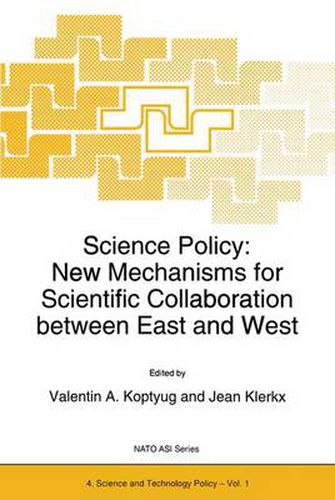Readings Newsletter
Become a Readings Member to make your shopping experience even easier.
Sign in or sign up for free!
You’re not far away from qualifying for FREE standard shipping within Australia
You’ve qualified for FREE standard shipping within Australia
The cart is loading…






This title is printed to order. This book may have been self-published. If so, we cannot guarantee the quality of the content. In the main most books will have gone through the editing process however some may not. We therefore suggest that you be aware of this before ordering this book. If in doubt check either the author or publisher’s details as we are unable to accept any returns unless they are faulty. Please contact us if you have any questions.
It is becoming increasingly clear that the future of the world cannot be sustained without scientific support, analysis, prediction and the use of scientific achievement. The immensity of the problems confronting us, coupled with the limited financial resources available, urgently demand the selection of priority areas of research, with a global combination of scientific effort.
The new geopolitical situation has uncovered Russia’s and the former Soviet Union’s scientific potential. This has given rise to wider opportunities for involvement in work on international projects and programmes, many of which are discussed in the present volume. The book addresses specifically priority fields of science in which joint, multidisciplinary research should be developed, encompassing rational use of natural resources and regional sustainable development, as well as the monitoring of the biosphere’s ecosystem state and the risks of natural and anthropogenic hazards, and the creation of new materials and technologies. The list of priorities includes Siberia’s economic, social and humanitarian problems, as well as the development of information systems for the rapid exchange of scientific data. There is a recognised need for the involvement of young scientists in partnership laboratories, in a probationary capacity.
$9.00 standard shipping within Australia
FREE standard shipping within Australia for orders over $100.00
Express & International shipping calculated at checkout
This title is printed to order. This book may have been self-published. If so, we cannot guarantee the quality of the content. In the main most books will have gone through the editing process however some may not. We therefore suggest that you be aware of this before ordering this book. If in doubt check either the author or publisher’s details as we are unable to accept any returns unless they are faulty. Please contact us if you have any questions.
It is becoming increasingly clear that the future of the world cannot be sustained without scientific support, analysis, prediction and the use of scientific achievement. The immensity of the problems confronting us, coupled with the limited financial resources available, urgently demand the selection of priority areas of research, with a global combination of scientific effort.
The new geopolitical situation has uncovered Russia’s and the former Soviet Union’s scientific potential. This has given rise to wider opportunities for involvement in work on international projects and programmes, many of which are discussed in the present volume. The book addresses specifically priority fields of science in which joint, multidisciplinary research should be developed, encompassing rational use of natural resources and regional sustainable development, as well as the monitoring of the biosphere’s ecosystem state and the risks of natural and anthropogenic hazards, and the creation of new materials and technologies. The list of priorities includes Siberia’s economic, social and humanitarian problems, as well as the development of information systems for the rapid exchange of scientific data. There is a recognised need for the involvement of young scientists in partnership laboratories, in a probationary capacity.